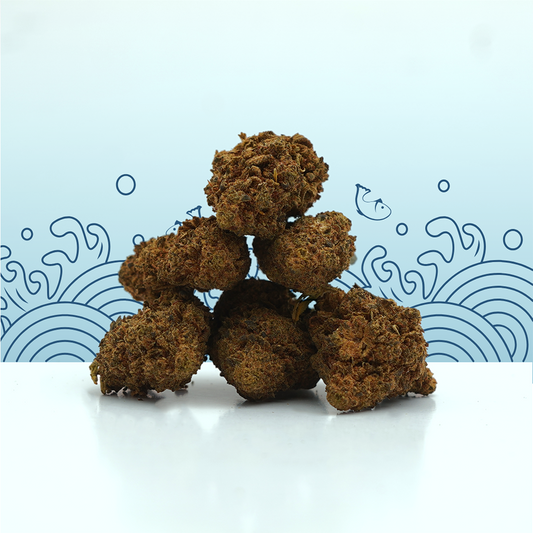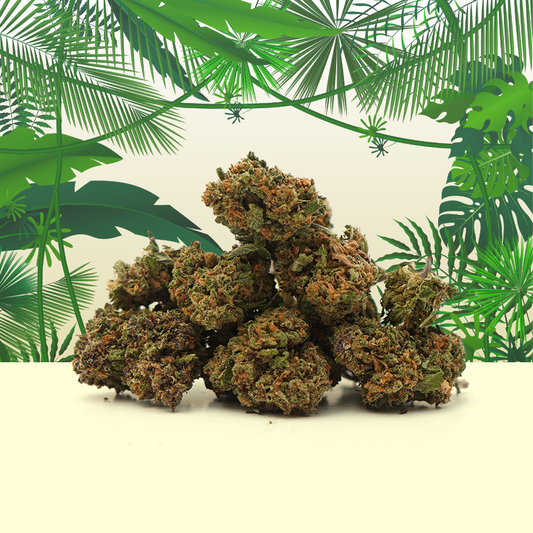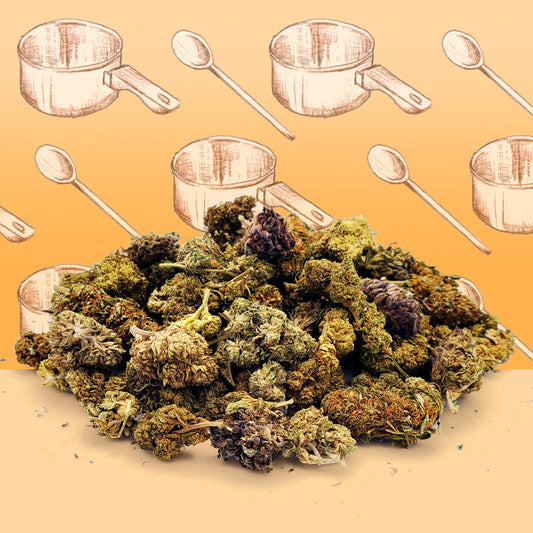Cannabis has been attracting attention for some years now. And not without reason! It has been discovered to be made up of numerous molecules, known as cannabinoids, and this biochemical complexity has attracted particular attention. This is particularly true of THCV, which has some very interesting characteristics. I will, of course, explain all this to you.
What is Tetrahydrocannabivarin (THCV)?
THCV is a derivative of THC, first discovered in the 1970s. However, it is only recently that scientific and recreational interest in it has really taken off.
Many products offered in CBD stores can now be enriched with THCV. The aim of all this? To offer you an experience tailored to your needs as a consumer, in complete legality.
But that's not all: researchers and laboratories are also particularly interested in THCV, which is still relatively unknown today.
How can THCV be distinguished from THC?
When it comes to molecules, there's a simple way to tell the difference: by looking at the chemical structure. THCV is one of many other molecules (like THCP) synthesized naturally from THC.
However, it's still a molecule in its own right. This incredible difference is due to just two fewer carbon atoms in THCV's side chain, compared with THC's five.
What does this mean in practice? Well, it means that THCV won't have the same effects on your brain as THC.
Each acts on the CB1 receptors responsible for psychotropic effects. But where THC is a CB1 receptor agonist (activator), THCV is an antagonist (inhibitor), like CBD. It will therefore counterbalance some of THC's effects, such as paranoia, hunger or anxiety.
However, if THCV were in high doses, it could itself create quite powerful psychoactive effects.
Where can I find THCV?
THCV is present in most varieties of cannabis. However, not all have the same concentration. If you want to know which strain would be the most interesting for understanding the effects of THCV, you'll find the answer in the so-called Sativa strains.
In fact, they're known for their "high" effect, which can be translated as an increase in energy, euphoria and creativity: effects that are mainly due to THCV.
How is THCV "made"?
THCV is manufactured within the cannabis plant itself.
Like all cannabinoids, THCV is produced by the plant in its acid form, known as THCV-A. When the plant is heated, the decarboxylation process takes place, transforming THCV-A into THCV.
Is THCV psychoactive?
THCV can indeed have psychoactive effects (i.e. it acts on the brain). It all depends on its composition and dosage.
Does this make it an equivalent and legal alternative to THC? It's a good question, but not an easy one to answer.
In a cannabis plant in its natural state, THCV is not the main molecule, and it's not its effects that take effect in the first place. In this context, it only has a regulating role and goes a little unnoticed. Its role is to modulate and attenuate the effects of THC, which can sometimes be too powerful.
These days, however, it's possible to enrich cannabis flowers with THCV. And in this case, THCV can give you real psychoactive effects, in particular that "high" I was talking about earlier. The sensations can come on quickly, quicker than THC, and quickly fade away.
Of course, like any other cannabis substance, the effects of THCV can vary from one individual to another. Depending on your constitution, you may feel nothing at all, or on the contrary, you may have a powerful experience.
What are the properties of THCV?
In its natural environment, THCV acts to counterbalance some of the effects of THC. So it's only logical that researchers and pharmaceutical companies should be interested in its properties. However, bear in mind that this information is based on certain scientific studies, and THCV has not been formally identified as a treatment or drug. On the other hand, I think you'll be interested to find out more, simply out of scientific curiosity.
Effects on appetite and blood sugar levels
One of THCV's primary roles is to prevent the "foncedalle" naturally caused by THC. This is why its use alone could have an appetite-suppressant effect.
Another potentially interesting feature is that it may act to regulate blood sugar levels.
Neuroprotective effects
THCV has shown potential as a neuroprotective agent. It could help protect the brain against degeneration, making it an interesting subject for research into neurodegenerative diseases such as Parkinson's and Alzheimer's.
Anti-inflammatory and antioxidant
Like many other cannabinoids (CBD, H4CBD, etc.), THCV has demonstrated anti-inflammatory and antioxidant properties.
Energy & Lucidity
This molecule can produce a stimulating effect that gives a sensation of renewed energy and mental clarity, in the same way as "Sativa" cannabis varieties.
Conclusion
THCV is attracting growing interest for its properties. Its structural difference from THC gives it a variety of effects, while raising questions about its legality and future use. Although it is legal to use in Ireland, it can be detected as THC during a police check. We'll see how things develop in the future, not only in terms of legal procedures, but also in the field of scientific research.




![Banana Cream CBG 🍌 [Greenhouse]](http://mamakana.com/cdn/shop/files/banana.jpg?v=1683038126&width=533)
![Bubba Kush CBD 🫧 [Greenhouse]](http://mamakana.com/cdn/shop/files/Bubba_fond_4b55b9bd-2083-406f-8843-1229994bb3ec.png?v=1738679473&width=533)




